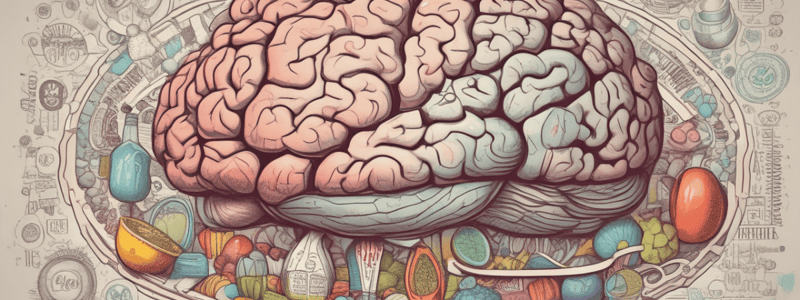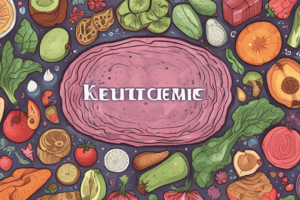Podcast
Questions and Answers
What is the primary source of fuel for the brain?
What is the primary source of fuel for the brain?
- Ketone bodies
- Glucose (correct)
- Fat
- Protein
What is the minimum amount of glucose required by the brain per hour to maintain consciousness?
What is the minimum amount of glucose required by the brain per hour to maintain consciousness?
- 5 grams
- 20 grams
- 15 grams
- 10 grams (correct)
What is the effect of ketone bodies on glucose demands by the brain?
What is the effect of ketone bodies on glucose demands by the brain?
- Has no effect on glucose demands
- Decreases glucose demands (correct)
- Increases glucose demands
- Varies depending on the individual
What is the primary mechanism of action of the ketogenic diet?
What is the primary mechanism of action of the ketogenic diet?
What is the primary use of the ketogenic diet?
What is the primary use of the ketogenic diet?
What is the result of excesses or deficiencies of fatty acids or carbohydrates in the body?
What is the result of excesses or deficiencies of fatty acids or carbohydrates in the body?
What is the definition of ketosis?
What is the definition of ketosis?
Which organ is unable to use ketone bodies or lipids as a source of energy?
Which organ is unable to use ketone bodies or lipids as a source of energy?
What is the primary mechanism by which the ketogenic diet acts to exert antiepileptogenic and anticonvulsant actions?
What is the primary mechanism by which the ketogenic diet acts to exert antiepileptogenic and anticonvulsant actions?
What is the primary focus of current research and future directions in the study of the ketogenic diet?
What is the primary focus of current research and future directions in the study of the ketogenic diet?
What is the significance of the ketogenic diet in the context of brain disorders and disease conditions?
What is the significance of the ketogenic diet in the context of brain disorders and disease conditions?
What is the metabolic signature of the ketogenic diet?
What is the metabolic signature of the ketogenic diet?
What is the role of the gut-brain methoxy-pyruvate-maleate mechanism in the ketogenic diet?
What is the role of the gut-brain methoxy-pyruvate-maleate mechanism in the ketogenic diet?
What is the significance of the specificities of diet treatment in the ketogenic diet?
What is the significance of the specificities of diet treatment in the ketogenic diet?
What is the potential benefit of combining the ketogenic diet with other treatment strategies?
What is the potential benefit of combining the ketogenic diet with other treatment strategies?
What is the role of the RAE 230 A and 230 2 paired cDNA expression array on Atlas glass spotted chips?
What is the role of the RAE 230 A and 230 2 paired cDNA expression array on Atlas glass spotted chips?
Flashcards are hidden until you start studying
Study Notes
Glucose and the Brain
- Glucose is the main and preferred fuel for the body, particularly the brain.
- The brain needs approximately 10 grams of glucose per hour to maintain consciousness.
- Ketone bodies are a suitable alternative fuel for the brain, being water-soluble and easily transportable.
Ketogenic Diet
- The ketogenic diet is a treatment for refractory epilepsy syndromes.
- It is induced by a reduction in carbohydrate consumption and an increase in fat and protein intake.
- The diet mimics the metabolic effects of prolonged fasting.
- Ketogenic diets are effective in treating drug-resistant seizures.
Mechanism of Ketogenic Diet
- The exact mechanism of the ketogenic diet is not fully understood.
- It was initially thought to act through a starvation mechanism, but this has been disproven.
- The diet induces a ketotic state, which is accompanied by glucose sparing and decreased glucose demands by the brain.
Ketosis
- Ketosis is defined as the generation of ketone bodies and release of free fatty acids from fat stores.
- Acetoacetate, beta-hydroxybutyrate, and acetone are the only biologically useful ketone bodies.
- Most organs can use ketone bodies or lipids as a source of energy, except for the liver.
Neurological Effects
- The neurological effects of the ketogenic diet are diverse and extend beyond epilepsy.
- It may relate to or intersect with neural adaptive mechanisms, such as synaptogenesis, suppression of neuroinflammation, and promotion of neuroprotection.
- The diet may have antiepileptogenic and disease-modifying capabilities in various disease states.
Therapeutic Applications
- The ketogenic diet has therapeutic applications in obesity, diabetes, and other conditions.
- The choice of therapeutic targets and specific diet treatment modulate the effects of the diet.
Studying That Suits You
Use AI to generate personalized quizzes and flashcards to suit your learning preferences.




